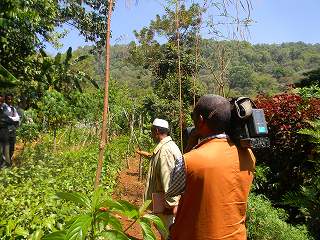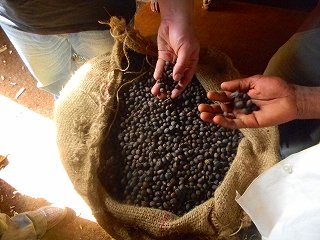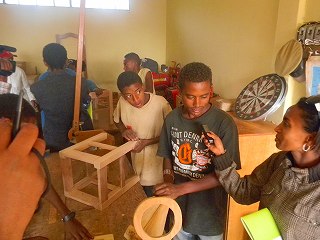|
Deputy Head of Mission of the Embassy of Japan, Mr. Yoshiaki Ito lead a Press Tour for journalists from the daily Addis Zemen, the Daily Monitor, the Afro FM and the Ethiopian Radio and Television Agency, to Belete-Gera natural forest area and Aba Jifar Skill Training Center in Jimma, Oromia from 28-31, January 2012.
This Tour is the third of its kind in 2011/2012, and focused on the Integrated Participatory Forest Management that is a cross-cutting project related to the environment and economy and empowers farmers at the grassroots level through linking their products, mainly certified coffee, to the international market chains.

During its four day stay, the Press Tour visited the Gera Naso Farmers Field School (FFS), the Afalo Forest coffee area and the Naso River, the Chira Oromia Forest and Wildlife Enterprise (OFWE) members, the Sedi, Mechi Chefe and Shabe WaBuBs (Forest Management Cooperatives) and the Abba Jifar Skill Training Center. The WaBuB is basically a farmers’ cooperative born out of the Forest Management Agreement (FMA), signed between the forest users (local community) and the government, based on the principle of Participatory Forest Management.
The Tour was first briefed by experts of the Japan International Cooperation Agency (JICA). The Press Tour then visited the Farmers Field School (FFS) at Gera Naso while farmers were on their actual Field Day.
One of the basic life changing activities of WaBuB is an integrated training called the Farmers Field School (FFS). FFS is an experience-based innovative, participatory and interactive learning approach that aims to build the farmers’ capacity to analyze the farming system and to identify their main constraints in agro-ecosystem analysis through learning sessions and field observations conducted every week.
The WaBuB cooperatives have now become global business partnerships and their members have benefitted through acquiring an organic coffee fair trade certificate that enables farmers to get fair prices and a premium on the international market.
So far, the Belete-Gera Forest Project has helped to establish 109 WaBuBs. Over 125 Joint Forest Management Agreements have been signed. Training has been given to over 286 FFSs, which graduated over 7,152 farmers (in the 4th round FFS, 35 WaBuBs are still under training). As a result, the income of the graduated farmers has increased to by 70 USD per household.

The other milestone work is the acquisition of ownership rights and certification of forest coffee accreditation from the International Rain Forest Alliance, based on the compliance on the side of the community to the rules of WaBub. On top of this, there has been a persistent forest audit every year with 100 specifications. Over 3,765 farmers were accredited in 2011/2012. In the same year, over 35.4 tons of certified forest coffee was exported to Japan at a premium price of 2.8 - 3.0 USD/kg for normal coffee and 6.15 USD/kg for Belete-Gera Certified Forest Coffee.
In September 2003, the Japan International Cooperation Agency (JICA) and the Oromia Forest and Wildlife Enterprise (OFWE) launched a Participatory Forest Management Project (PFMP) by building farmers’ capacity development in the Belete-Gera forest area, which covers about 160,000 hectares of land and benefits the communities of 125 villages.

In addition to this, the Press Tour also visited the Project for the Expansion of the Abba Jifar Skill Training Center in Jimma town, which was constructed at a cost of USD 89,606. The Tour observed the actual skill training sessions in the areas of woodwork, metal work, handicrafts, leather work, and hairdressing. Beneficiaries of this project are street children, school dropouts, abandoned and abused children, unemployed people, mothers (female-headed households) and commercial sex workers.
The Center also offers street children rehabilitation programs with the aim of improving the livelihoods of disadvantaged people around Jimma Town. Mr. Ito and the journalists visited orphans at the training center where the children played and danced for the guests.
|
|



